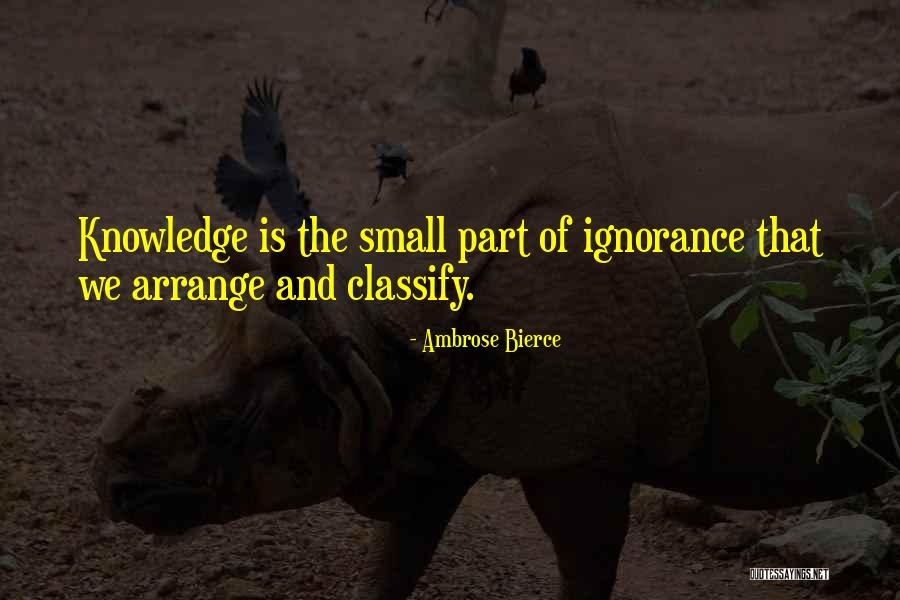Bierce Ambrose Quotes & Sayings
Enjoy reading and share 100 famous quotes about Bierce Ambrose with everyone.
Top Bierce Ambrose Quotes

A popular writer writes about what people think. A wise writer offers them something to think about. — Ambrose Bierce
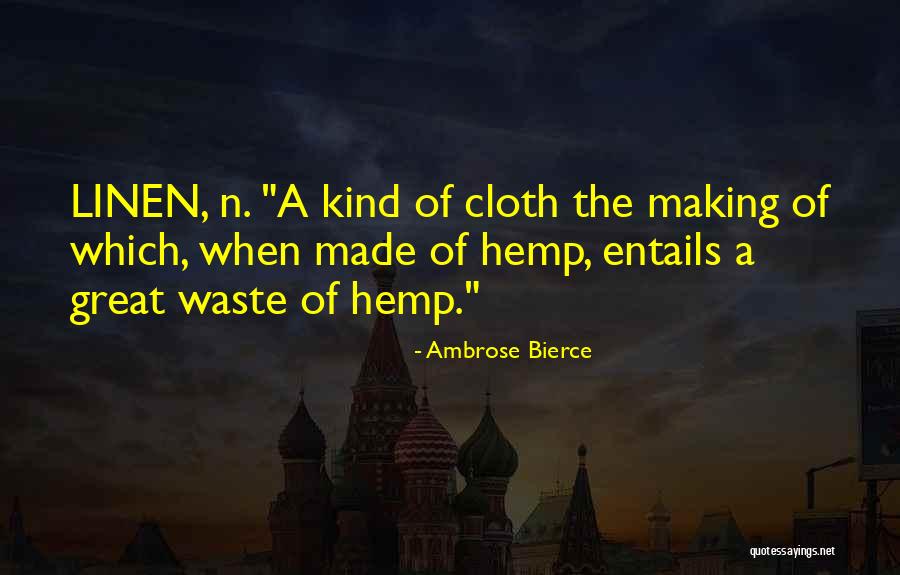
LINEN, n. "A kind of cloth the making of which, when made of hemp, entails a great waste of hemp." — Ambrose Bierce
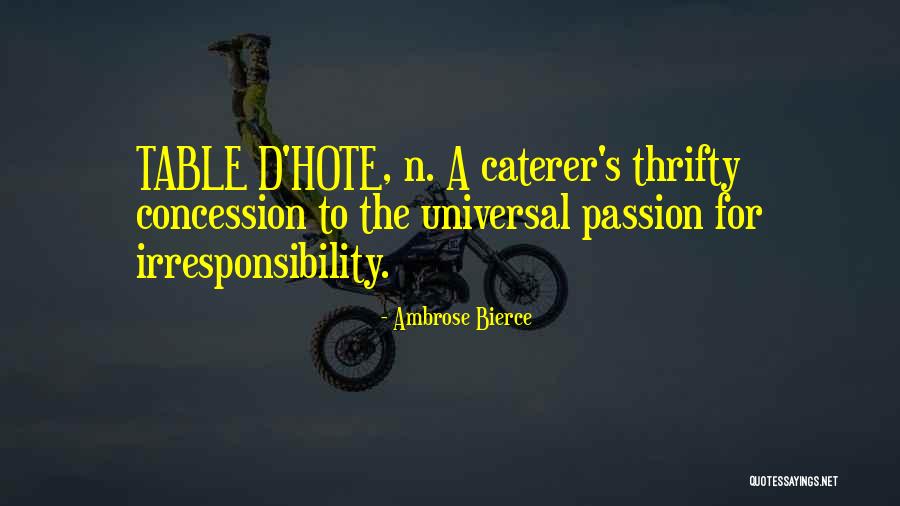
TABLE D'HOTE, n. A caterer's thrifty concession to the universal passion for irresponsibility. — Ambrose Bierce

CEMETERY, n. An isolated suburban spot where mourners match lies, poets write at a target and stone-cutters spell for a wager. — Ambrose Bierce

A book which the Mohammedans foolishly believe to have been written by divine inspiration, but which Christians know to be a wicked imposture, contradictory to the Holy Scriptures. — Ambrose Bierce
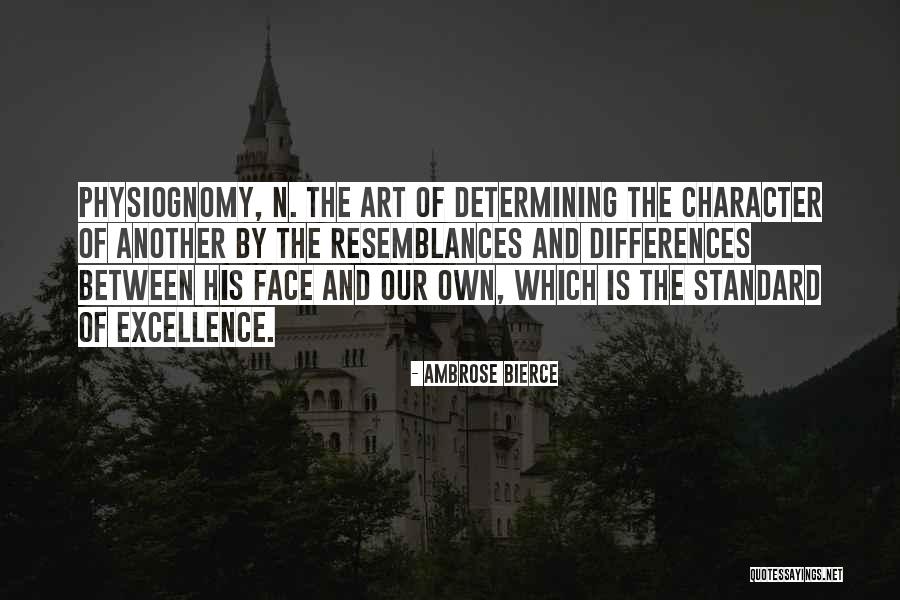
PHYSIOGNOMY, n. The art of determining the character of another by the resemblances and differences between his face and our own, which is the standard of excellence. — Ambrose Bierce
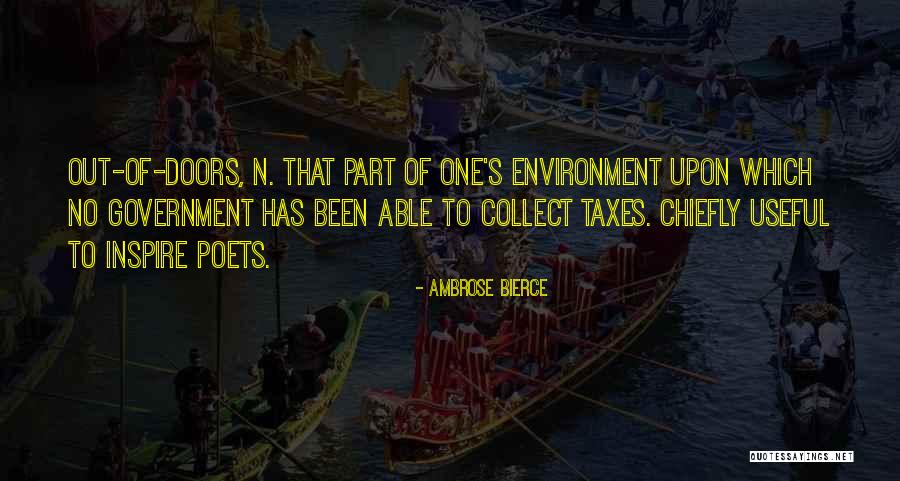
OUT-OF-DOORS, n. That part of one's environment upon which no government has been able to collect taxes. Chiefly useful to inspire poets. — Ambrose Bierce
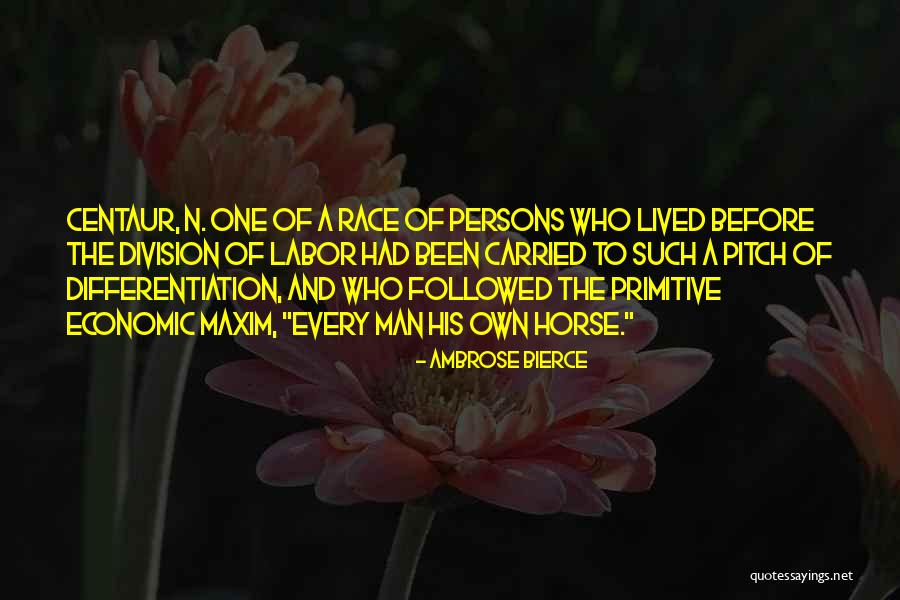
CENTAUR, n. One of a race of persons who lived before the division of labor had been carried to such a pitch of differentiation, and who followed the primitive economic maxim, "Every man his own horse." — Ambrose Bierce

CARNIVOROUS, adj. Addicted to the cruelty of devouring the timorous vegetarian, his heirs and assigns. — Ambrose Bierce

PLEONASM, n. An army of words escorting a corporal of thought. — Ambrose Bierce

CONSULT, v.i. To seek another's disapproval of a course already decided on. — Ambrose Bierce
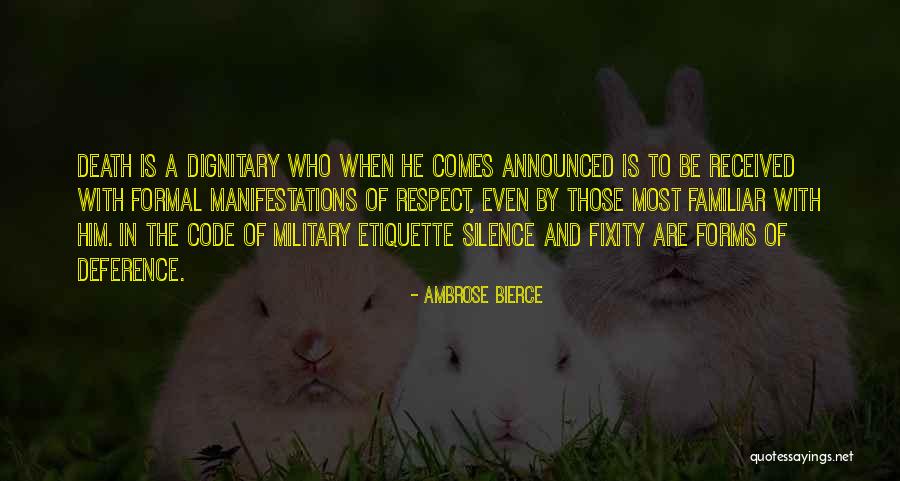
Death is a dignitary who when he comes announced is to be received with formal manifestations of respect, even by those most familiar with him. In the code of military etiquette silence and fixity are forms of deference. — Ambrose Bierce
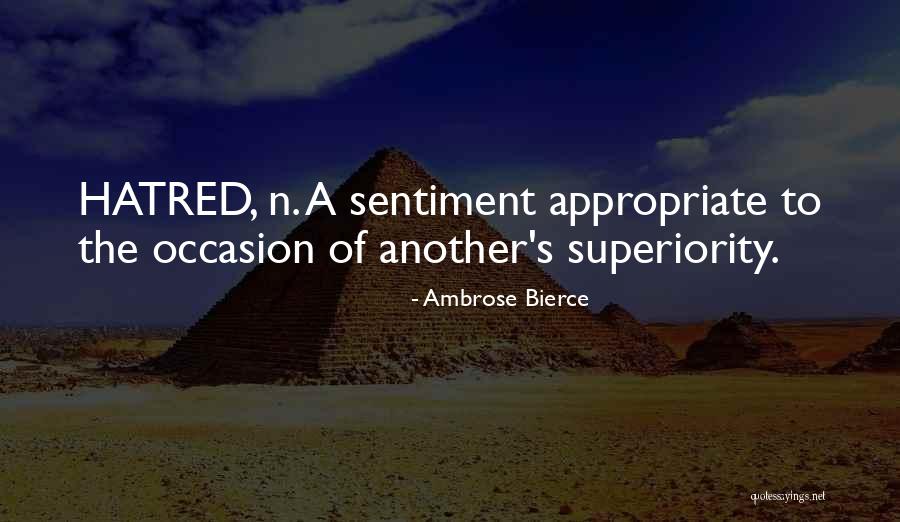
HATRED, n. A sentiment appropriate to the occasion of another's superiority. — Ambrose Bierce

Riven and torn with cannon-shot, the trunks of the trees protruded bunches of splinters like hands, the fingers above the wound interlacing with those below. — Ambrose Bierce
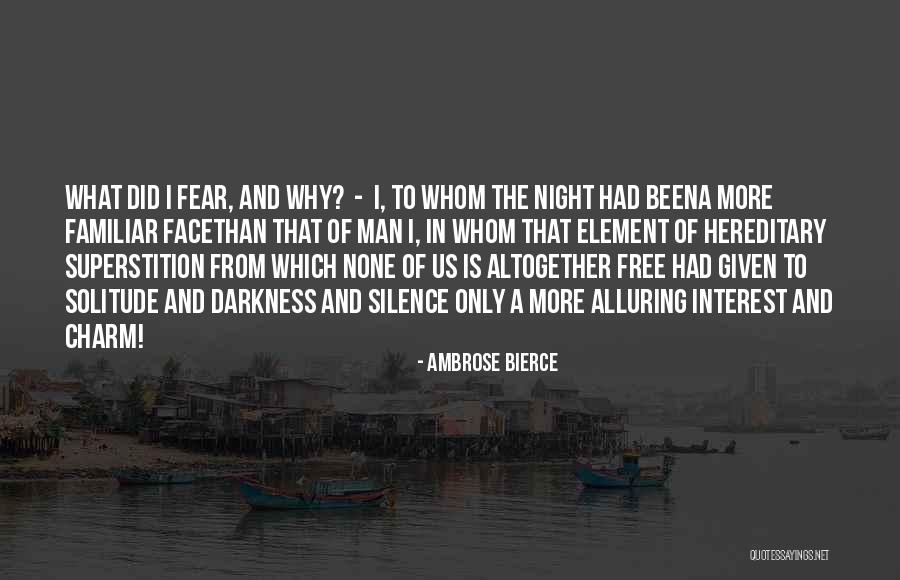
What did I fear, and why? - I, to whom the night had been
a more familiar face
than that of man
I, in whom that element of hereditary superstition from which none of us is altogether free had given to solitude and darkness and silence only a more alluring interest and charm! — Ambrose Bierce

OPERA, n. A play representing life in another world, whose inhabitants have no speech but song, no motions but gestures and no postures but attitudes. — Ambrose Bierce
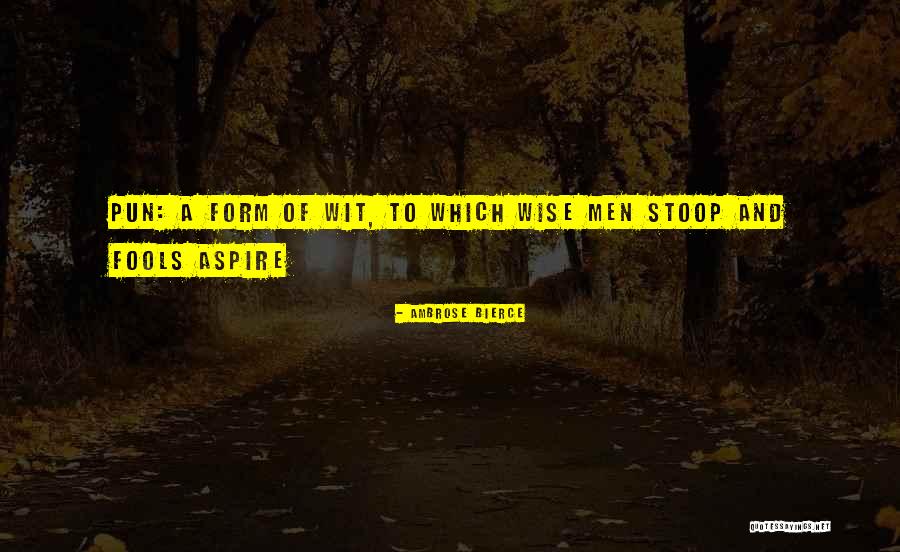
Pun: A form of wit, to which wise men stoop and fools aspire — Ambrose Bierce

Photograph: a picture painted by the sun without instruction in art. — Ambrose Bierce
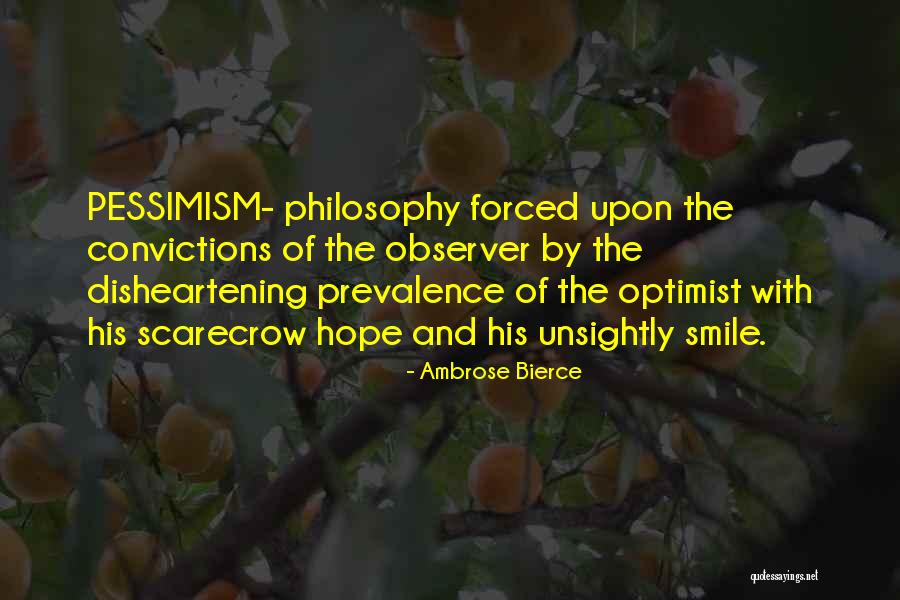
PESSIMISM- philosophy forced upon the convictions of the observer by the disheartening prevalence of the optimist with his scarecrow hope and his unsightly smile. — Ambrose Bierce

CUI BONO? [Latin] What good would that do "me"? — Ambrose Bierce

IMPOSTOR n. A rival aspirant to public honors. — Ambrose Bierce

An archbishop is an ecclesiastical dignitary one point holier than a bishop. — Ambrose Bierce

Achievement is the death of endeavor and the birth of disgust. — Ambrose Bierce
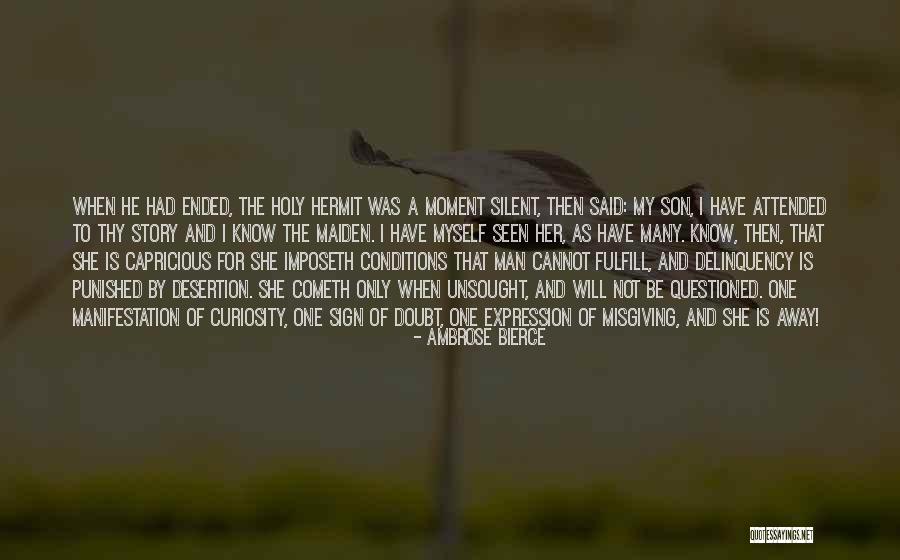
When he had ended, the holy hermit was a moment silent, then said: My son, I have attended to thy story and I know the maiden. I have myself seen her, as have many. Know, then, that she is capricious for she imposeth conditions that man cannot fulfill, and delinquency is punished by desertion. She cometh only when unsought, and will not be questioned. One manifestation of curiosity, one sign of doubt, one expression of misgiving, and she is away! — Ambrose Bierce
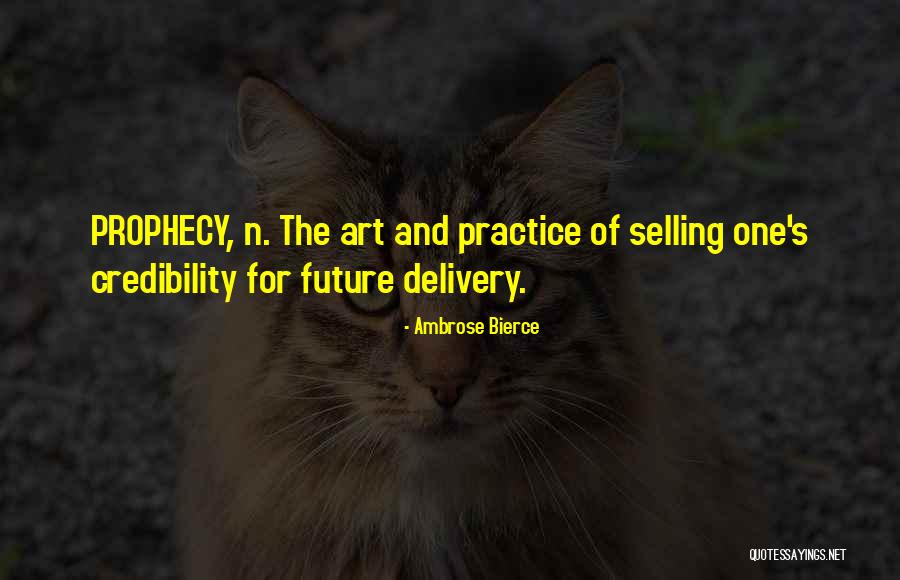
PROPHECY, n. The art and practice of selling one's credibility for future delivery. — Ambrose Bierce

Insurance - an ingenious modern game of chance in which the player is permitted to enjoy the comfortable conviction that he is beating the man who keeps the table. — Ambrose Bierce

PASTIME, n. A device for promoting dejection. Gentle exercise for intellectual debility. — Ambrose Bierce
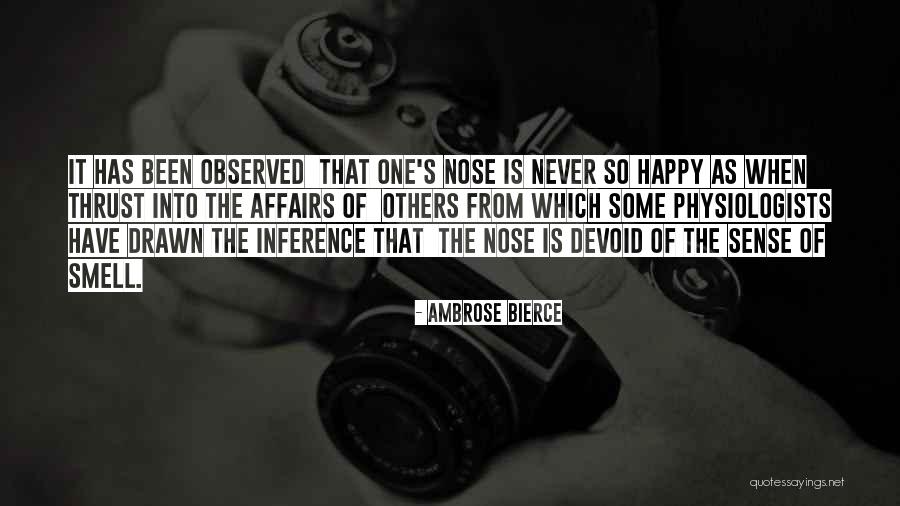
It has been observed
that one's nose is never so happy as when thrust into the affairs of
others from which some physiologists have drawn the inference that
the nose is devoid of the sense of smell. — Ambrose Bierce
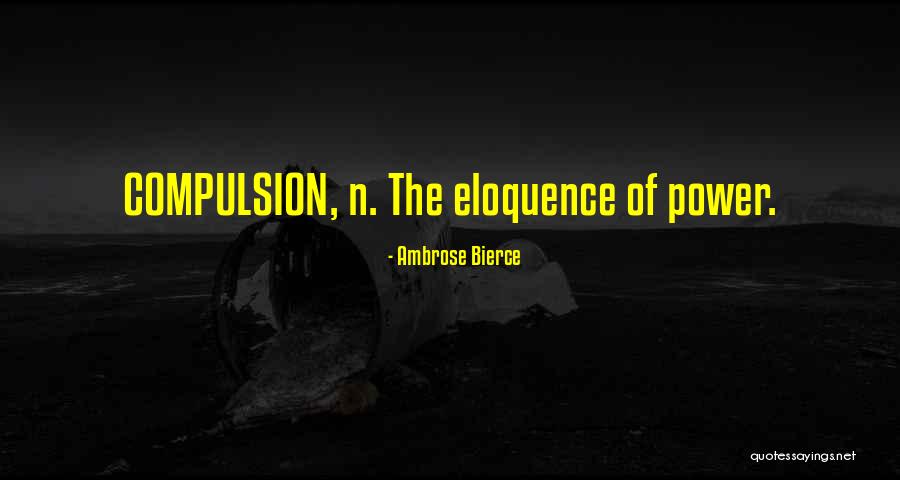
COMPULSION, n. The eloquence of power. — Ambrose Bierce

Immigrant: An unenlightened person who thinks one country better than another. — Ambrose Bierce
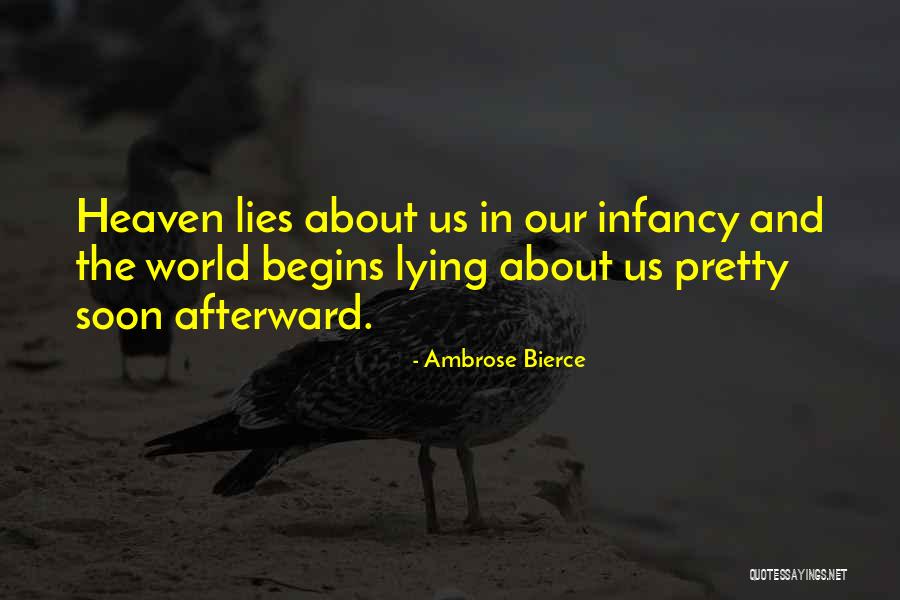
Heaven lies about us in our infancy and the world begins lying about us pretty soon afterward. — Ambrose Bierce

DEPENDENT, adj. Reliant upon another's generosity for the support which you are not in a position to exact from his fears. — Ambrose Bierce

Happiness is lost by criticizing it; sorrow by accepting it. — Ambrose Bierce

An auctioneer is a man who proclaims with a hammer that he has picked a pocket with his tongue. — Ambrose Bierce
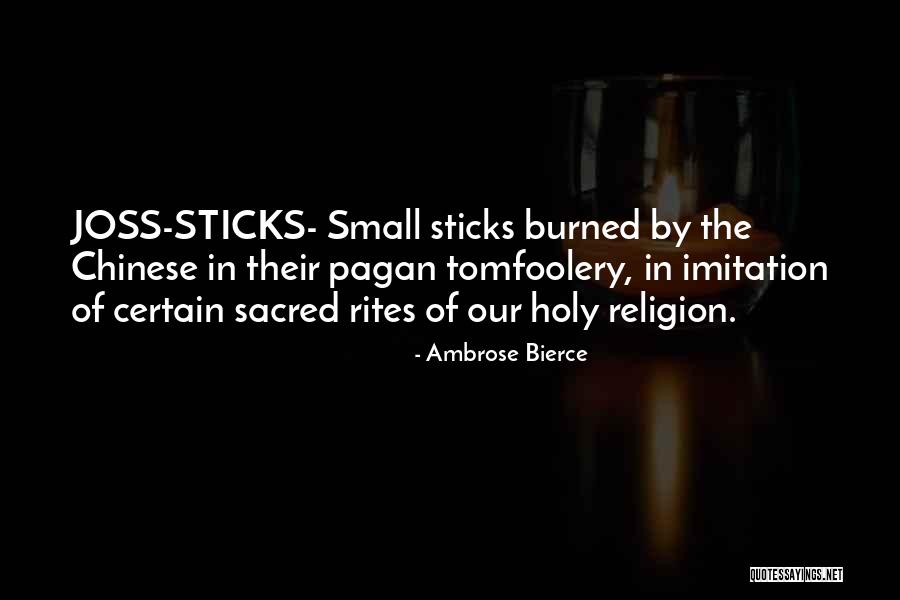
JOSS-STICKS- Small sticks burned by the Chinese in their pagan tomfoolery, in imitation of certain sacred rites of our holy religion. — Ambrose Bierce

STORY, n. A narrative, commonly untrue. The truth of the stories here following has, however, not been successfully impeached. — Ambrose Bierce

DIAGNOSIS, n. A physician's forecast of disease by the patient's pulse and purse. — Ambrose Bierce

CARTESIAN, adj. Relating to Descartes, author of 'Cogito ergo sum' to demonstrate the reality of human existence. The dictum might be improved 'Cogito cogito ergo cogito sum' 'I think that I think, therefore I think that I am' as close an approach. — Ambrose Bierce

LEGACY, n. A gift from one who is legging it out of this vale of tears. — Ambrose Bierce

Potable, n. Suitable for drinking. Water is said to be potable; indeed, some declare it our natural beverage, although even they find it palatable only when suffering from the recurrent disorder known as thirst, for which it is a medicine. — Ambrose Bierce
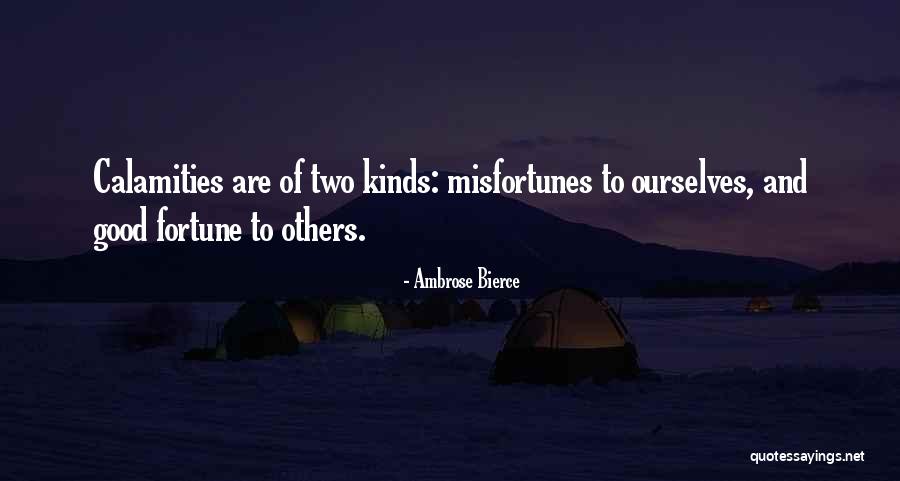
Calamities are of two kinds: misfortunes to ourselves, and good fortune to others. — Ambrose Bierce

Christian - One who follows the teachings of Christ insofar as they are not inconsistent with a life of sin. — Ambrose Bierce

The ghost is the outward and visible signs of an inward fear. — Ambrose Bierce
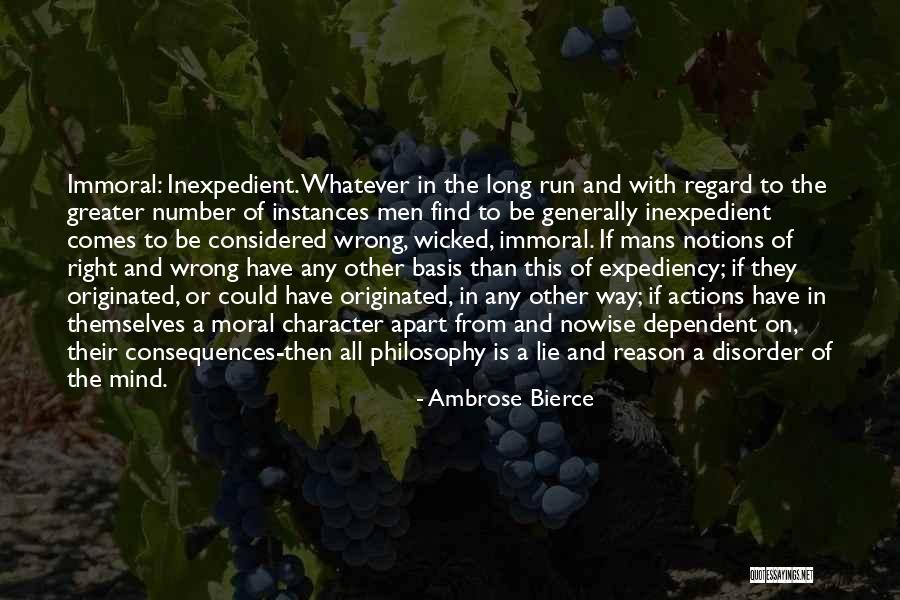
Immoral: Inexpedient. Whatever in the long run and with regard to the greater number of instances men find to be generally inexpedient comes to be considered wrong, wicked, immoral. If mans notions of right and wrong have any other basis than this of expediency; if they originated, or could have originated, in any other way; if actions have in themselves a moral character apart from and nowise dependent on, their consequences-then all philosophy is a lie and reason a disorder of the mind. — Ambrose Bierce

BATH, n. A kind of mystic ceremony substituted for religious worship, with what spiritual efficacy has not been determined. — Ambrose Bierce
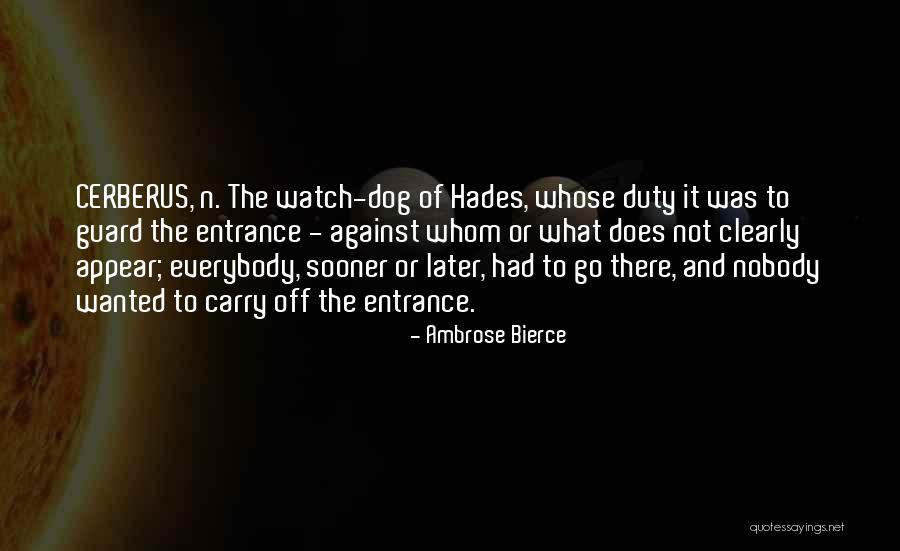
CERBERUS, n. The watch-dog of Hades, whose duty it was to guard the entrance - against whom or what does not clearly appear; everybody, sooner or later, had to go there, and nobody wanted to carry off the entrance. — Ambrose Bierce

EMOTION, n. A prostrating disease caused by a determination of the heart to the head. It is sometimes accompanied by a copious discharge of hydrated chloride of sodium from the eyes. — Ambrose Bierce
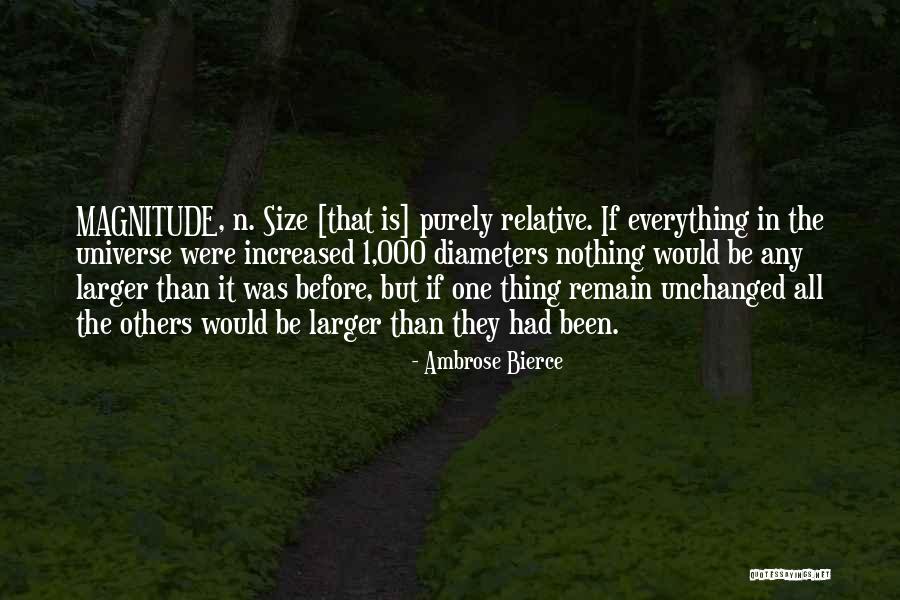
MAGNITUDE, n. Size [that is] purely relative. If everything in the universe were increased 1,000 diameters nothing would be any larger than it was before, but if one thing remain unchanged all the others would be larger than they had been. — Ambrose Bierce

Homo Creator's testimony to the sound construction and fine finish of Deus Creatus. A popular form of abjection, having an element of pride. — Ambrose Bierce

A leech who, having penetrated the shell of a turtle only to find that the creature has long been dead, deems it expedient to form a new attachment to a fresh turtle. — Ambrose Bierce
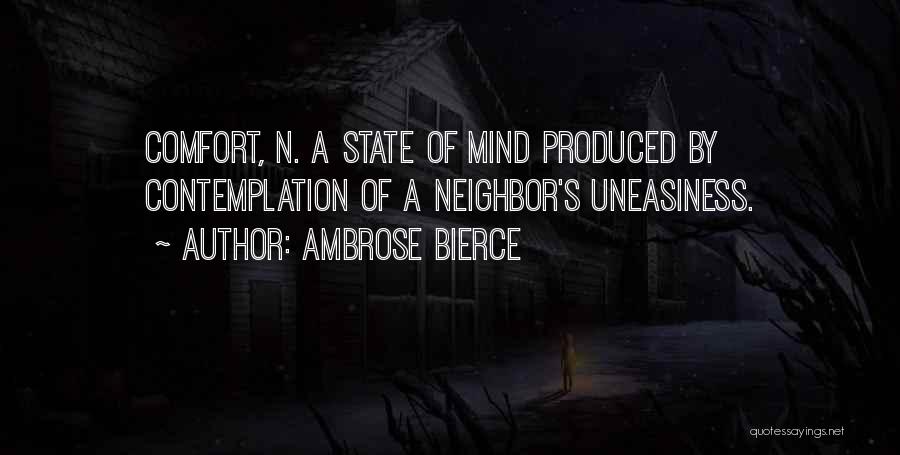
COMFORT, n. A state of mind produced by contemplation of a neighbor's uneasiness. — Ambrose Bierce

Mad, adj. Affected with a high degree of intellectual independence. — Ambrose Bierce

The game of discontent has its rules, and he who disregards them cheats. It is not permitted to you to wish to add another's advantages or possessions to your own; you are permitted only to wish to be another. — Ambrose Bierce

A man is the sum of his ancestors; to reform him you must begin with a dead ape and work downward through a million graves. — Ambrose Bierce

Democracy is four wolves and a lamb voting on what to have for lunch. — Ambrose Bierce

Duck-bill, n. Your account at your restaurant during the canvas-back season. — Ambrose Bierce

CALUMNUS, n. A graduate of the School for Scandal. — Ambrose Bierce

The covers of this book are too far apart. — Ambrose Bierce
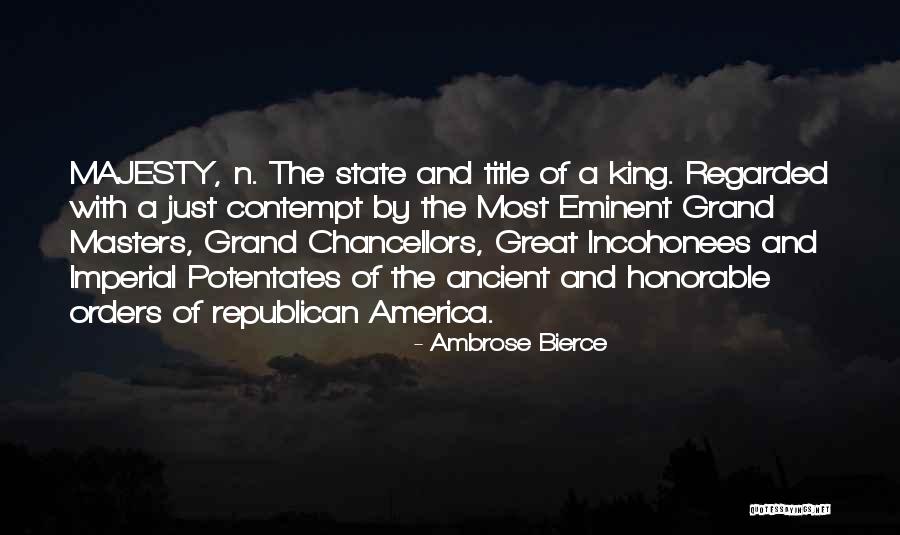
MAJESTY, n. The state and title of a king. Regarded with a just contempt by the Most Eminent Grand Masters, Grand Chancellors, Great Incohonees and Imperial Potentates of the ancient and honorable orders of republican America. — Ambrose Bierce
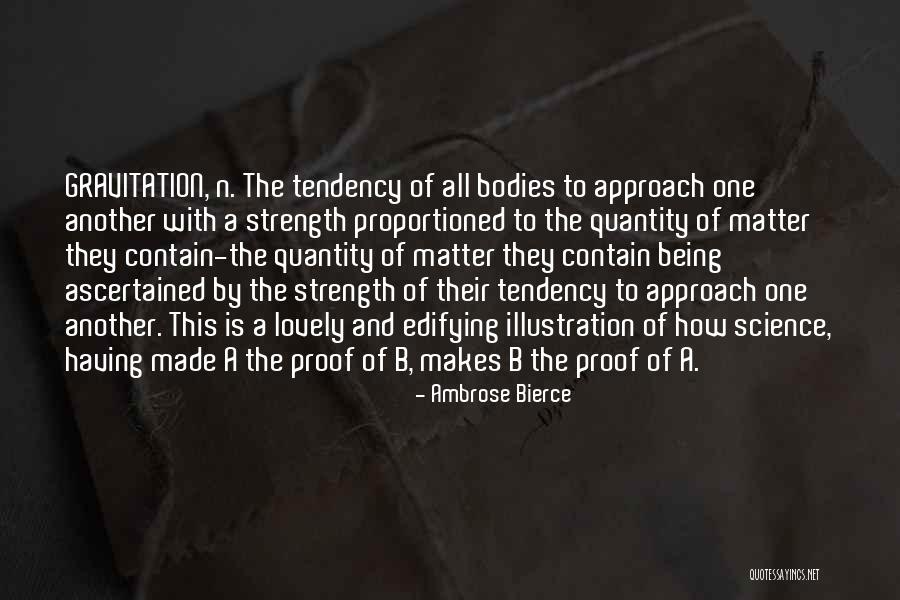
GRAVITATION, n. The tendency of all bodies to approach one another with a strength proportioned to the quantity of matter they contain-the quantity of matter they contain being ascertained by the strength of their tendency to approach one another. This is a lovely and edifying illustration of how science, having made A the proof of B, makes B the proof of A. — Ambrose Bierce
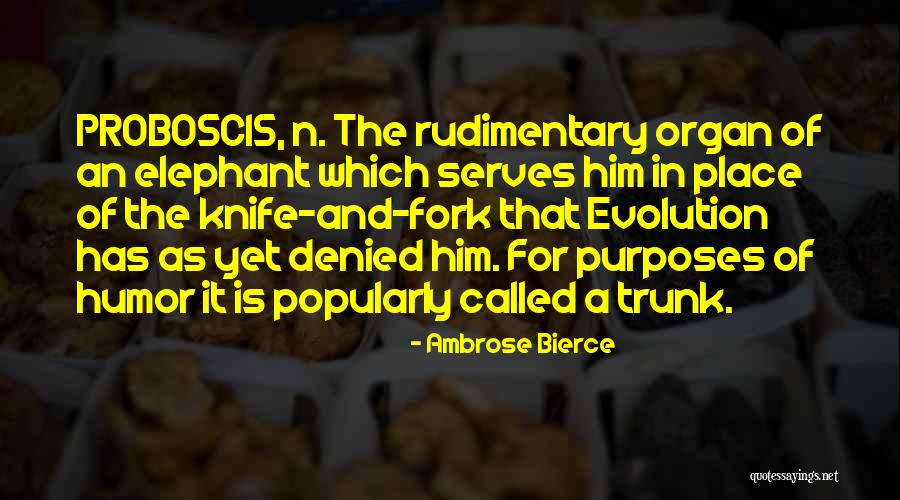
PROBOSCIS, n. The rudimentary organ of an elephant which serves him in place of the knife-and-fork that Evolution has as yet denied him. For purposes of humor it is popularly called a trunk. — Ambrose Bierce
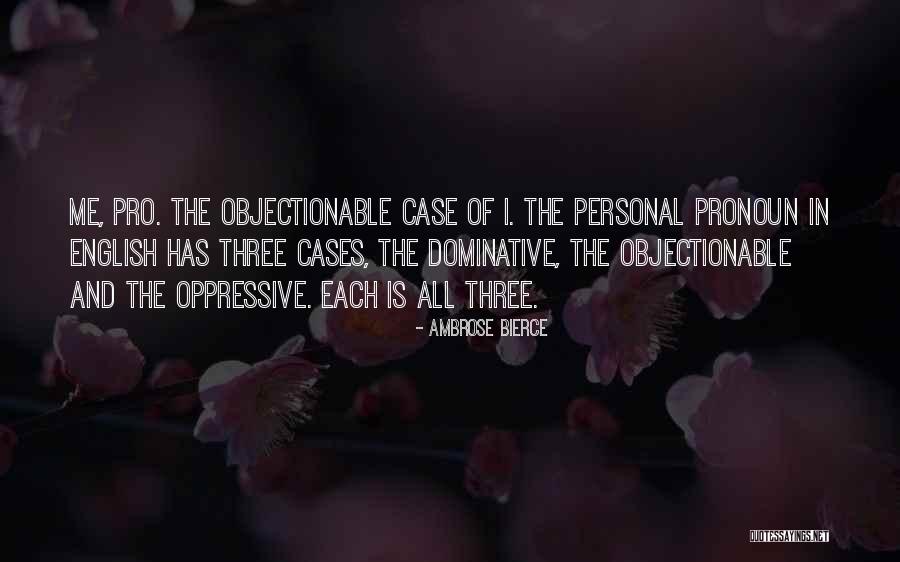
Me, pro. The objectionable case of I. The personal pronoun in English has three cases, the dominative, the objectionable and the oppressive. Each is all three. — Ambrose Bierce

YANKEE, n. In Europe, an American. In the Northern States of our Union, a New Englander. In the Southern States the word is unknown. — Ambrose Bierce
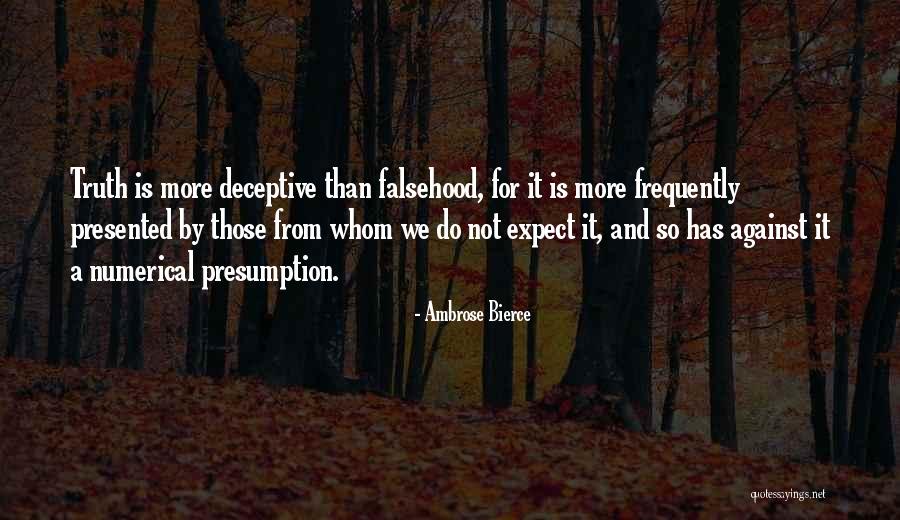
Truth is more deceptive than falsehood, for it is more frequently presented by those from whom we do not expect it, and so has against it a numerical presumption. — Ambrose Bierce

CONSOLATION, n. The knowledge that a better man is more unfortunate than yourself. — Ambrose Bierce

TENACITY, n. A certain quality of the human hand in its relation to the coin of the realm. It attains its highest development in the hand of authority and is considered a serviceable equipment for a career in politics. — Ambrose Bierce

REFUSAL, n. Denial of something desired; Refusals are graded in a descending scale of finality thus: the refusal absolute, the refusal condition, the refusal tentative and the refusal feminine. The last is called by some casuists the refusal assentive. — Ambrose Bierce

WRATH, n. Anger of a superior quality and degree, appropriate to exalted characters and momentous occasions; as, "the wrath of God," "the day of wrath," etc ... — Ambrose Bierce
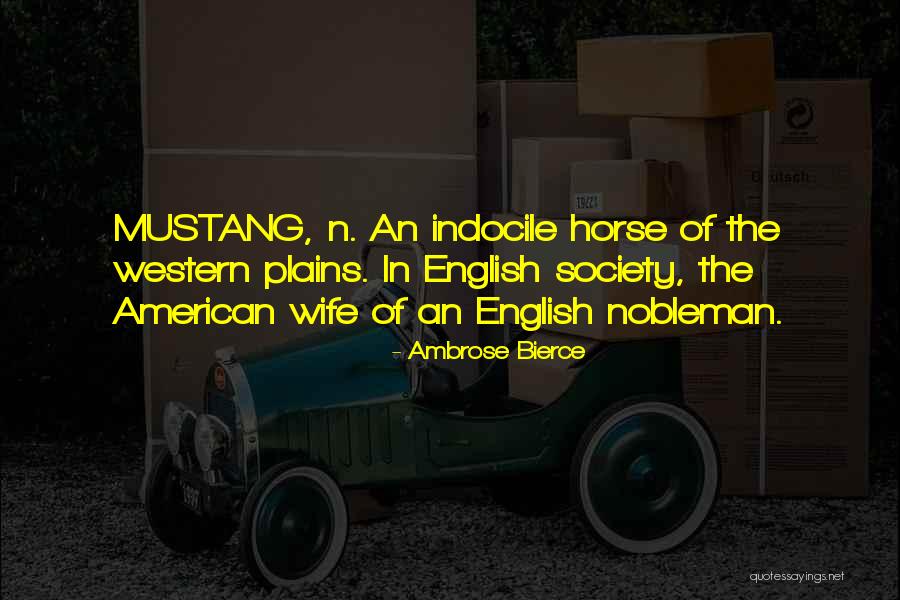
MUSTANG, n. An indocile horse of the western plains. In English society, the American wife of an English nobleman. — Ambrose Bierce
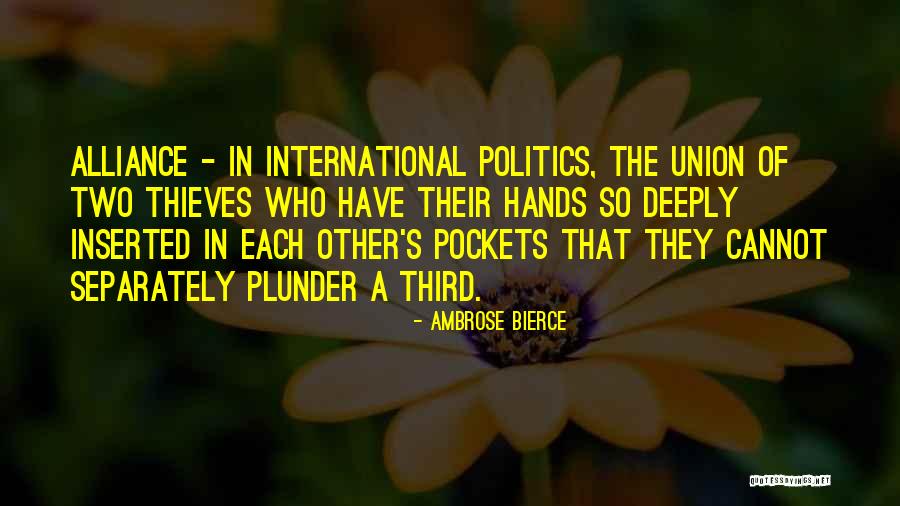
Alliance - in international politics, the union of two thieves who have their hands so deeply inserted in each other's pockets that they cannot separately plunder a third. — Ambrose Bierce
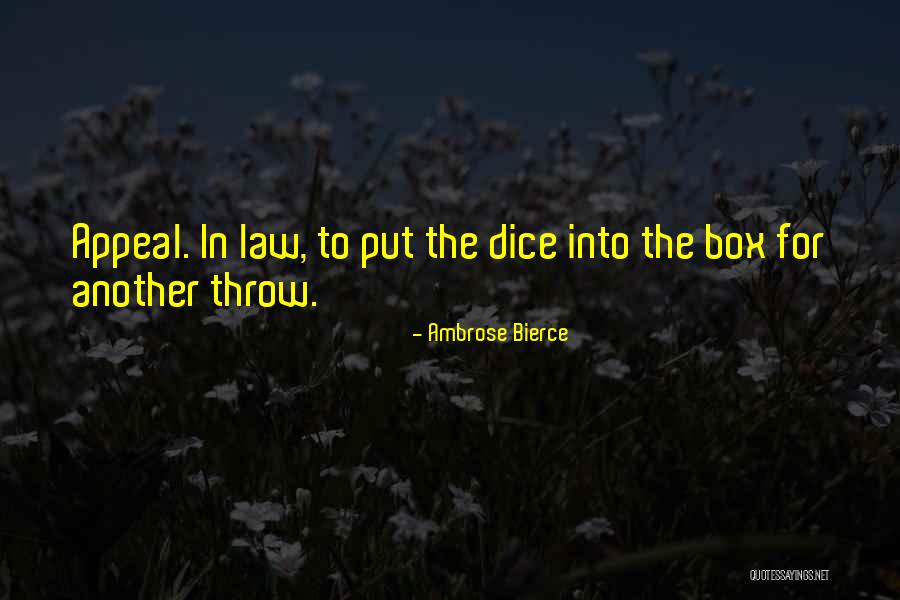
Appeal. In law, to put the dice into the box for another throw. — Ambrose Bierce
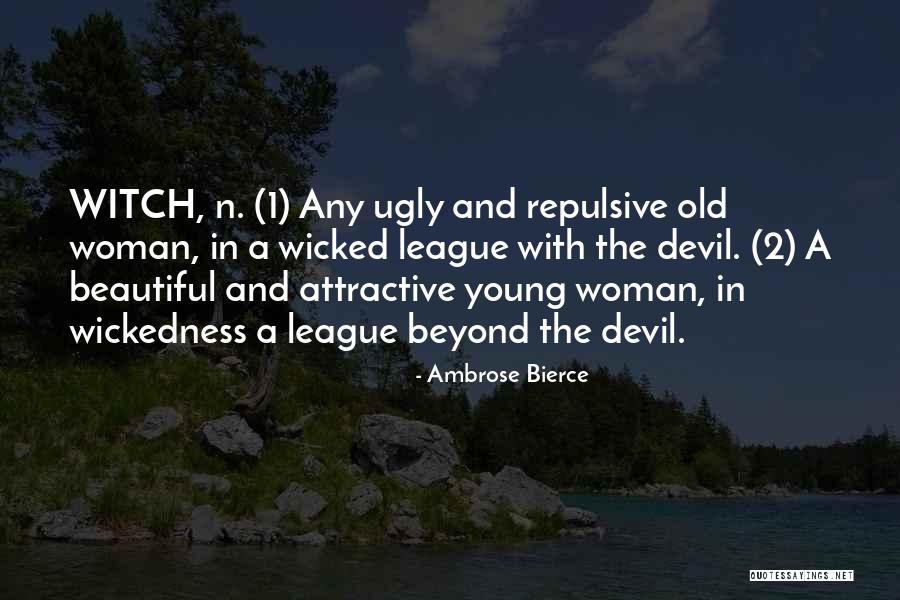
WITCH, n. (1) Any ugly and repulsive old woman, in a wicked league with the devil. (2) A beautiful and attractive young woman, in wickedness a league beyond the devil. — Ambrose Bierce

Ambidextrous, adj.: Able to pick with equal skill a right-hand pocket or a left. — Ambrose Bierce
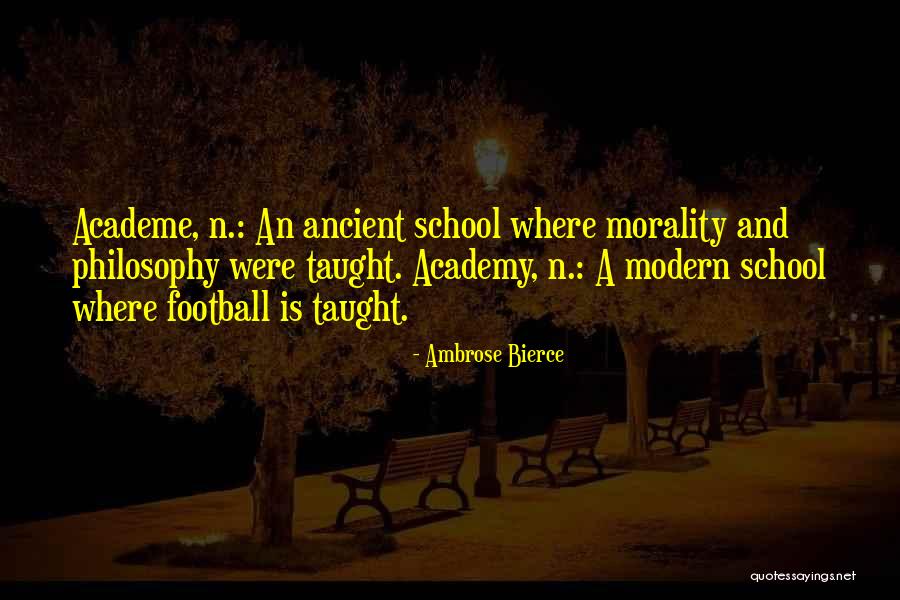
Academe, n.: An ancient school where morality and philosophy were taught. Academy, n.: A modern school where football is taught. — Ambrose Bierce

HARMONISTS, n. A sect of Protestants, now extinct, who came from Europe in the beginning of the last century and were distinguished for the bitterness of their internal controversies and dissensions. — Ambrose Bierce
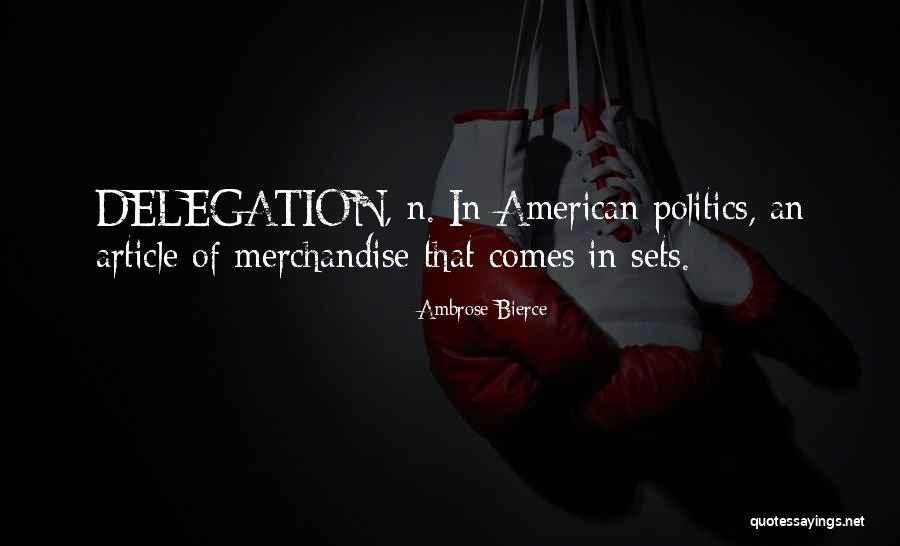
DELEGATION, n. In American politics, an article of merchandise that comes in sets. — Ambrose Bierce

HAND, n. A singular instrument worn at the end of the human arm and commonly thrust into somebody's pocket. — Ambrose Bierce
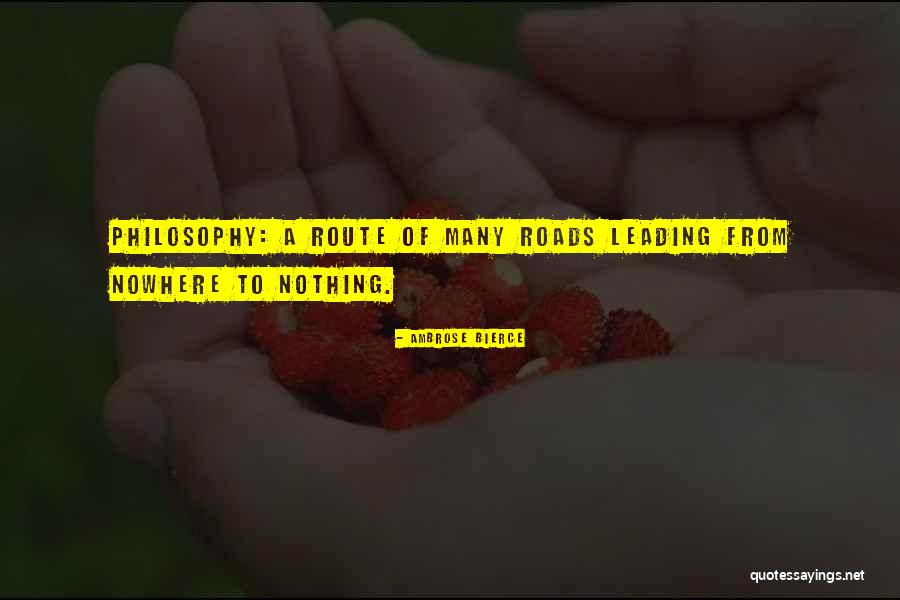
Philosophy: A route of many roads leading from nowhere to nothing. — Ambrose Bierce
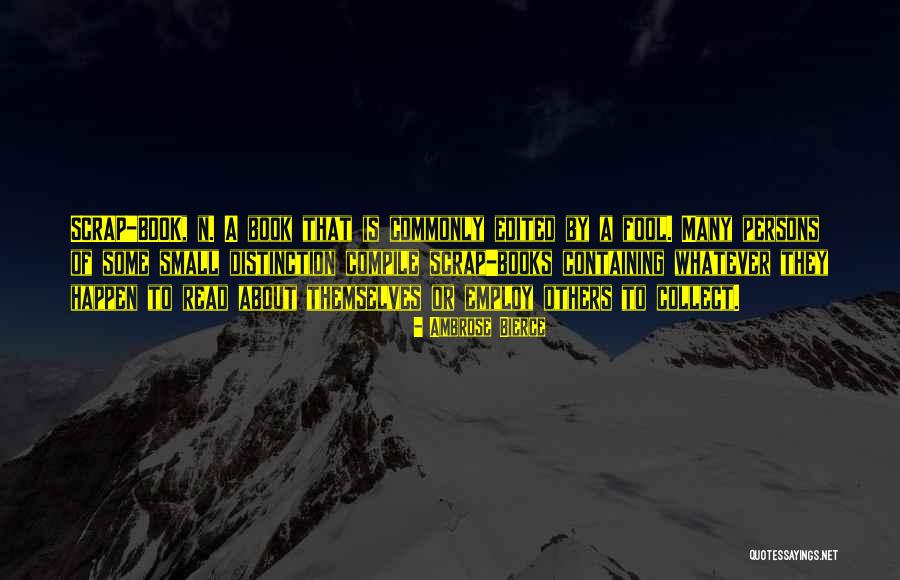
SCRAP-BOOK, n. A book that is commonly edited by a fool. Many persons of some small distinction compile scrap-books containing whatever they happen to read about themselves or employ others to collect. — Ambrose Bierce
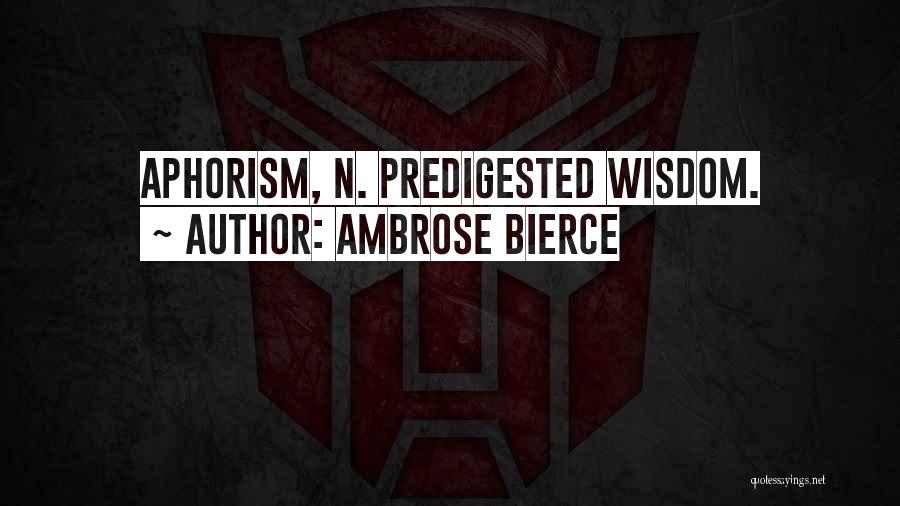
Aphorism, n. Predigested wisdom. — Ambrose Bierce
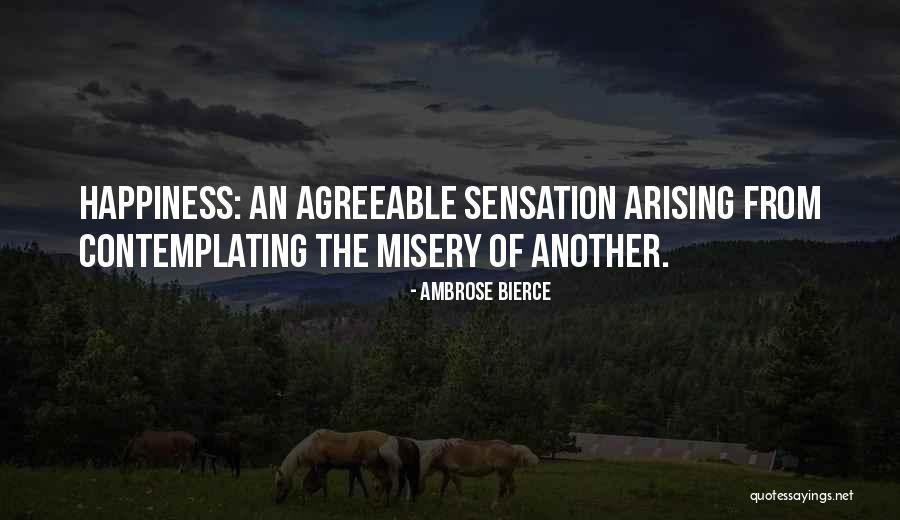
Happiness: an agreeable sensation arising from contemplating the misery of another. — Ambrose Bierce

READING, n. The general body of what one reads. In our country it consists, as a rule, of Indiana novels, short stories in "dialect" and humor in slang. — Ambrose Bierce

PLAGIARIZE, v. To take the thought or style of another writer whom one has never, never read. — Ambrose Bierce

Birth, n.: The first and direst of all disasters. — Ambrose Bierce
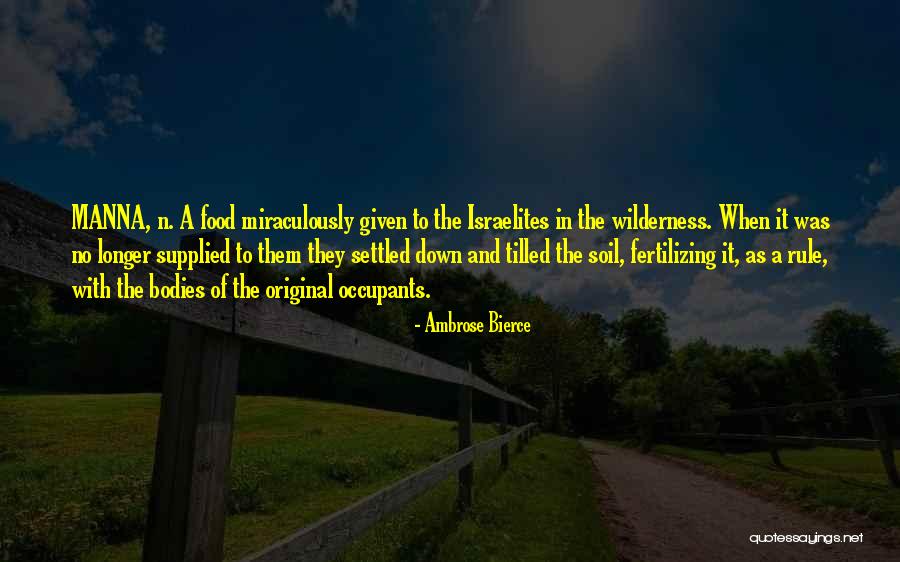
MANNA, n. A food miraculously given to the Israelites in the wilderness. When it was no longer supplied to them they settled down and tilled the soil, fertilizing it, as a rule, with the bodies of the original occupants. — Ambrose Bierce
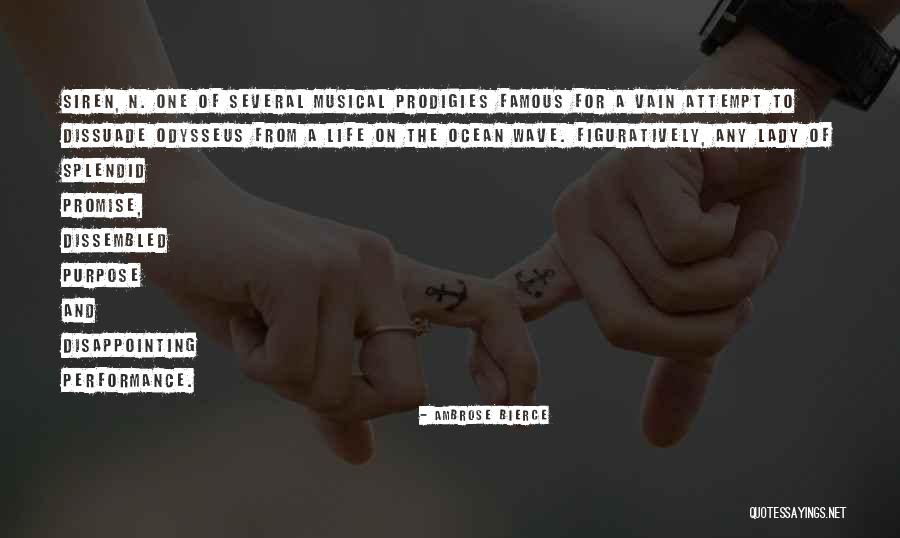
SIREN, n. One of several musical prodigies famous for a vain attempt to dissuade Odysseus from a life on the ocean wave. Figuratively, any lady of splendid promise, dissembled purpose and disappointing performance. — Ambrose Bierce

HUSBAND, n. One who, having dined, is charged with the care of the plate. — Ambrose Bierce
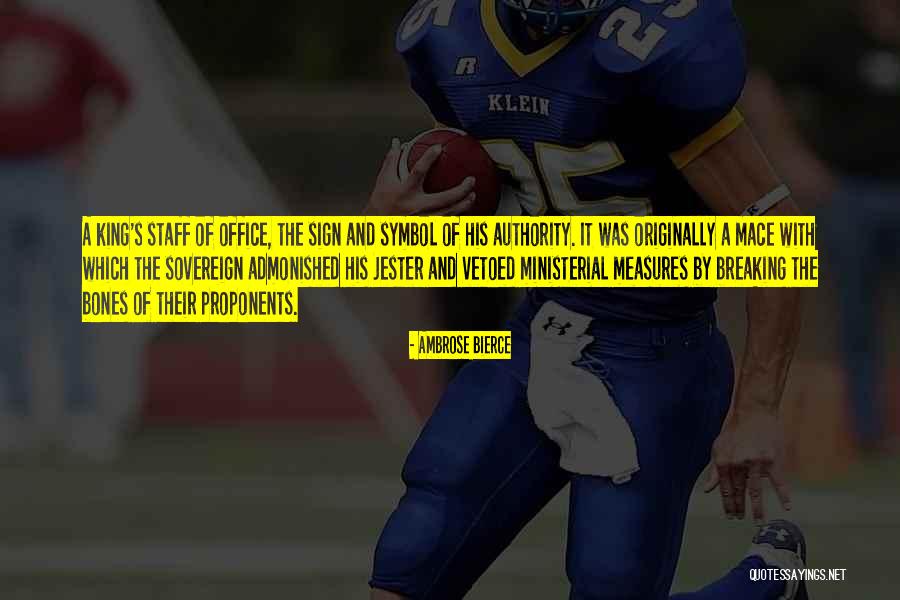
A king's staff of office, the sign and symbol of his authority. It was originally a mace with which the sovereign admonished his jester and vetoed ministerial measures by breaking the bones of their proponents. — Ambrose Bierce

MINISTER, n. An agent of a higher power with a lower responsibility. In diplomacy, an officer sent into a foreign country as the visible embodiment of his sovereign's hostility. — Ambrose Bierce

Work: a dangerous disorder affecting high public functionaries who want to go fishing. — Ambrose Bierce
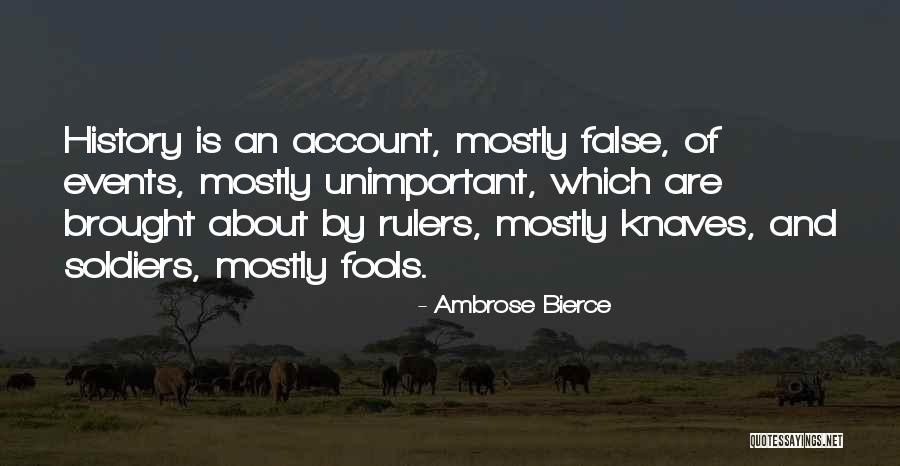
History is an account, mostly false, of events, mostly unimportant, which are brought about by rulers, mostly knaves, and soldiers, mostly fools. — Ambrose Bierce

Youth is Gilead, in which is balm for every wound. — Ambrose Bierce
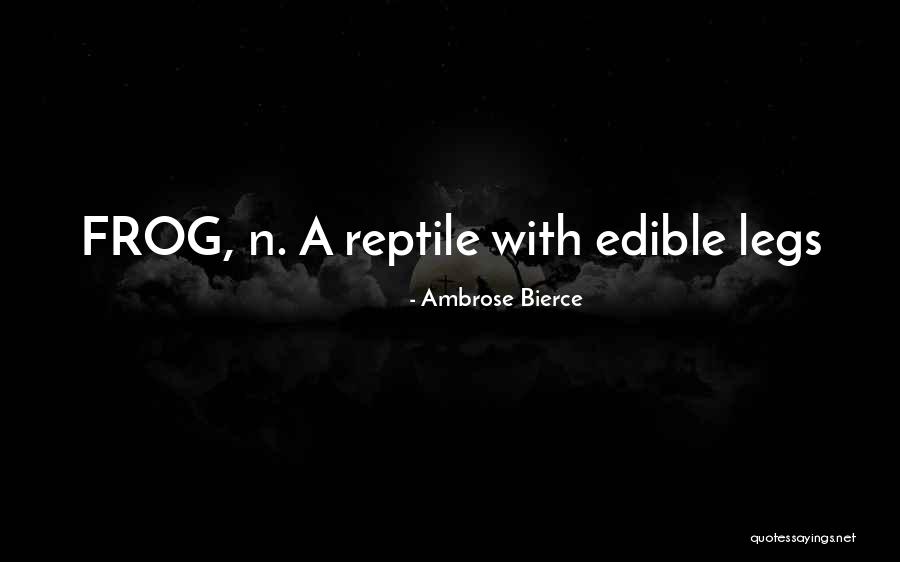
FROG, n. A reptile with edible legs — Ambrose Bierce
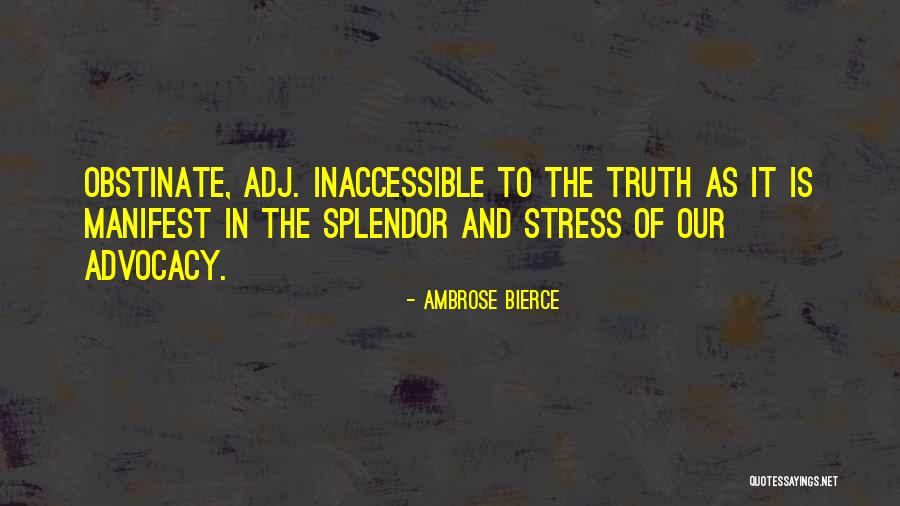
OBSTINATE, adj. Inaccessible to the truth as it is manifest in the splendor and stress of our advocacy. — Ambrose Bierce

Christians and camels receive their burdens kneeling. — Ambrose Bierce









